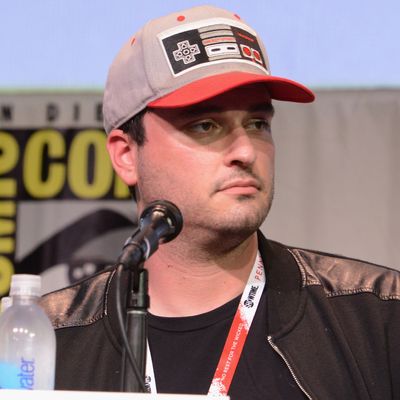
Poor Josh Trank — the hits keep coming.
After 2012’s Chronicle minted him as a 27-year-old director with a No. 1 film, Trank was not only given the job of rebooting Fantastic Four, he was also tapped to direct one of the Star Wars spinoffs that will launch later this year with Gareth Edwards’s Rogue One. But after Fantastic Four was beset by some of the worst pre-release buzz ever to plague a movie (let’s hope those dogs have reformed their ways), Trank left/was removed from his Star Wars duties. Later, after FF had crashed and burned in theaters, he and Fox desperately blamed each other for the debacle.
Since then, Trank has been laying low. His name, however, still comes up as a sort of urban myth filmmakers tell each other late at night. Take, for example, yesterday’s fascinating Kim Masters interview in The Hollywood Reporter with Steven Spielberg, Lucasfilm head Kathleen Kennedy, and producer Frank Marshall. After discussing the spectacular success of director Colin Trevorrow, whom Kennedy and Marshall recommended for Jurassic World duties after seeing his indie Safety Not Guaranteed (Trevorrow will also helm Episode IX), Masters asks the group, “So when you look at young directors, how do you know you’re not hiring another Josh Trank?”
Spielberg’s response: “Who is that?”
(That sound you just heard was the world’s largest pane of glass breaking into a hundred million pieces.)
Kennedy answers next:
“It’s all instinctual. One of the things I’ve come to realize since I’ve been in this position of keeping Star Wars going is that in addition to looking for somebody who can creatively have an impact, you’re really looking for leadership skills. No one steps into these big movies without being able to genuinely lead the charge with hundreds of people and [handle] the relationship with the studio. That’s a very difficult thing to do, and you don’t know [a person can do] that until you get to spend time and watch somebody operate.”
Put aside, for a second, Spielberg’s response — which, while fun to interpret as merciless shade, is almost certainly innocent in nature. Kennedy doesn’t even own up to the fact that she did hire Trank, and then un-hired him. Now, it’s possible that there were other parts of this conversation, either made off the record or cut from the article. But as it reads on the page, this is a brutal dismissal of Trank as an artist, an erasure of his involvement in the Star Wars franchise, and one that essentially renders him shorthand for “failed young director.” That doesn’t seem fair.
As long as there has been a Hollywood, there has been “director jail,” the place where men and women go after they make movies that, for whatever reason, ruin their careers: from Alexander Mackendrick after The Sweet Smell of Success to Michael Cimino with Heaven’s Gate to Elaine May and Ishtar to Tony Kaye and American History X. (It’s no coincidence, in retrospect, that these movies are good-to-great.) But none of them were under 30, and none of them were taking on nine-figure studio tentpoles, a relatively new phenomenon, particularly in the way they’re viewed right now: as pieces of IP first, and movies second.
Trank appears to be the first victim of the new high-stakes game for young directors, in which, after just one or two small films, they’re called up to direct movies with ten or 20 times the budget, and face a commensurate raising of expectations with no room for failure. It’s the artistic equivalent of when high-school basketball players could jump directly to the pros — sure, you’d get your Kobe Bryants, but you were also going to have a number of Robert Swifts.
Nobody thinks Trank should’ve escaped scot-free from the debacle that was Fantastic Four. I don’t blame anyone for making jokes about him — reports from the set are not flattering — or citing him as an example of what happens when a director graduates to the big leagues before he’s ready. But this also sets a dangerous precedent. If every promising director is going to be defined by his second or third movie, especially when they’re making a massive jump in scale and budget, we’re about to see a lot more talent failing out of the system before they’ve even had the chance to reach their potential. Just ask Spielberg, who had trouble of his own in his early 30s with the notorious and disappointing 1941. It isn’t that Trank should be handed another plum job so he has the chance to redeem himself. He just shouldn’t be written off yet.

